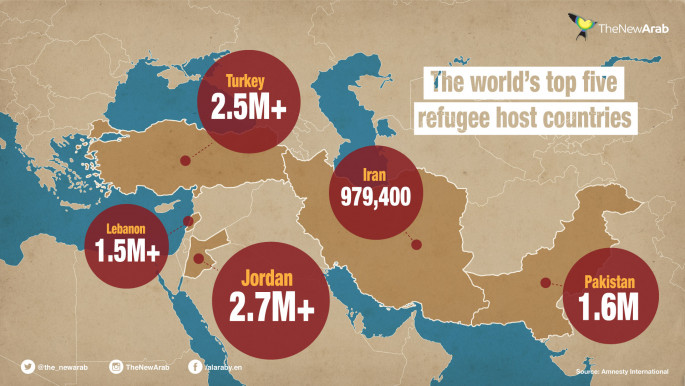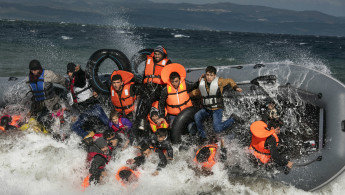Wealthy countries 'doing the least' for world's refugees
The brunt on the global refugee problem fell mostly on countries immediately neighbouring the crisis zones, Amnesty said, slamming what is called the selfishness of wealthy nations.
The top refugee hosting country was Jordan, which took in over 2.7 million refugees. It is followed by Turkey, with more than 2.5 million, Pakistan, 1.6 million and Lebanon with more than 1.5 million.
Also on the top 10 list is Iran [979,400 refugees], Ethiopia [736,100]; Kenya [553,900]; Uganda [477,200]; Democratic Republic of Congo [383,100], and Chad [369,500].
Fifty-six percent of refugees are being sheltered in these 10 countries, according to the report.
Amnesty said many of the world's wealthiest nations "host the fewest and do the least".
"The report highlights how rich nations are woefully failing to take in their fair share of the world's refugees," Sara Hashash, Amnesty International's Media Manager for the Middle East and North Africa told The New Arab.
"They have displayed a disgraceful absence of leadership and responsibility in the face of a growing crisis," Hashash said.
"The lack of global responsibility sharing for the refugee crisis has left countries neighbouring conflict zones to shoulder the vast majority of refugees."
"For example more than 95 percent of Syria's refugees are in just five countries in the region – Turkey, Lebanon, Jordan, Iraq and Egypt."
 |
More than 95% of Syria's refugees are in just five countries in the region – Turkey, Lebanon, Jordan, Iraq and Egypt |  |
 |
"Globally, today just 10 countries are hosting 56 percent of the world's refugees," Hashash told The New Arab.
"This situation is entirely unsustainable and is leaving millions of refugees fleeing war, persecution and repression in countries like Syria, Afghanistan, Iraq to live in dire condition."
"In some cases refugees are at risk of being sent back to places where they face human rights violations or conflict."
The "self-interest" of some wealthier countries meant the international refugee crisis was set to get worse, not better, Amnesty said.
"It is not simply a matter of sending aid money. Rich countries cannot pay to keep people 'over there'," it said.
The rights group proposed a solution whereby the world's countries find a home for 10 percent of the planet's refugees every year.
"The report sets out a fair and practical solution to the crisis based on a system that use objective criteria such as wealth, population size and unemployment rate to assess what fair share of refugees each states should take in," Hashash told The New Arab.
"World leaders must work out a fair system based on this criteria to share responsibility for helping refugees."
As the conflict in Syria continues onto its sixth year, almost five million people, half of which are children, have sought refuge outside the war-torn country.
Meanwhile, refugees from other areas of conflicts continue to risk their lives attempting to reach Europe. Last week, Save the Children rescued 30 unaccompanied minors from the Mediterranean.



